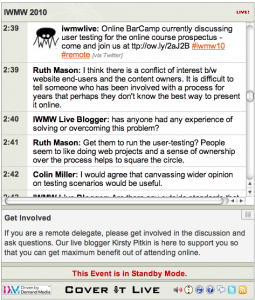Online BarCamp Review
5:15 pm in barcamps by kirsty-pitkin
We gathered in the event live blog, hosted through CoverItLive. This live blog has been active throughout the event, providing none-Twitter users with a channel to view the live commentary and delegate tweets, as well a facility to post their own comments and questions without the need for a login. Comments were moderated, as there was no obligation for people to identify themselves when making a comment.
For the BarCamp, I disabled the feed from the #iwmw10 hash tag, which effectively gave us a clear discussion space without the tweets from delegates in other BarCamp sessions. I invited participants to introduce themselves and to suggest topics of interest for discussion. As each person introduced themselves, I granted them unmoderated posting on an individual basis to enable freer flowing discussion.
The topic of most interest that seemed to evolve was the online course prospectus, with the discussion focussing on user testing, moving away from print and managing the politics of content contribution. There were some interesting experiences shared: including usability studies conducted by business students as part of their assessment process. The discussion then widened out to include the use of social media in the recruitment process – particularly the use of IM, which one participant had found substantially improved post-graduate recruitment.
The BarCamp also provided a useful opportunity to talk with the remote audience about their experiences of event amplification and to check how everything is going for them. They are apparently all waiting for a Gordon Brown moment when a speaker forgets they are being live streamed at the beginning or end of a presentation! We also have some useful feedback about requirements of certain institutional firewalls which have prevented access to the live video stream. Remote delegates were also able to build direct relationships and exchange contact details. The feedback from the BarCamp was very supportive, and their was an enthusiasm to see the talk archived for future reference and for other delegates to access the discussion.

0 Responses to Online BarCamp Review